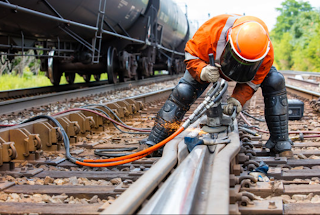One of the most critical components of working in the railway industry—particularly in the UK—is the Personal Track Safety certification. This certification ensures that workers understand the rules and safety protocols required to operate effectively and safely on or near railway tracks. Preparing for this certification is essential, and this is where the PTS mock test comes into play.
Understanding Railway Operations
What Are Railway Operations?
Railway operations encompass all activities involved in managing train services, maintaining infrastructure, and ensuring safe and efficient transportation. This includes planning train schedules, managing freight and passenger services, maintaining signaling systems, and ensuring compliance with safety regulations.
Key Components of Railway Operations
- Infrastructure Management: This involves maintaining tracks, bridges, tunnels, and stations. It ensures that trains run smoothly without disruptions.
- Signaling and Communication: Signal systems control train movements and prevent accidents by ensuring trains are appropriately spaced.
- Rolling Stock Management: This includes maintenance of trains, locomotives, and wagons to ensure they are in optimal condition.
- Timetable Planning and Scheduling: Proper scheduling ensures maximum efficiency and minimizes delays.
- Safety Management: Safety is the highest priority in railway operations, involving inspections, safety drills, and adherence to regulations.
- Customer Service: Passenger satisfaction, ticketing, and station services form the human-centered side of railway operations.
The Importance of Safety in Railway Operations
Railways are high-risk environments where safety lapses can lead to catastrophic outcomes. From high-speed passenger trains to heavy freight services, ensuring safety at every level of operation is critical.
Key Safety Measures
- Track Maintenance: Ensuring that the tracks are free from defects to prevent derailments.
- Signaling Systems: Preventing collisions through automated signals and communication systems.
- Staff Training: Workers must be trained to handle emergency situations and follow safety protocols.
- Protective Equipment: Workers are required to wear high-visibility clothing, helmets, and other protective gear.
- Certification: Obtaining certifications like the PTS is crucial to prove competency in railway safety.
How Railway Professionals Benefit from PTS Mock Tests
For professionals working in the railway sector, a PTS mock test is not just about passing an exam; it is about reinforcing safety knowledge and understanding real-world applications. Here’s how:
- Enhanced Risk Awareness: The questions in mock tests often cover real-life scenarios, preparing workers for unexpected events on the tracks.
- Continuous Learning: Even experienced professionals can use mock tests to refresh their knowledge.
- Compliance: Regular practice ensures that workers stay compliant with updated safety regulations.
A Day in Railway Operations
To understand the importance of PTS and railway safety, let’s take a closer look at what a typical day in railway operations might involve:
- Morning Inspections: Maintenance crews perform track and signal inspections to ensure everything is functional before trains start running.
- Coordination Meetings: Operations managers review schedules, weather forecasts, and maintenance plans.
- Freight and Passenger Movement: Trains are dispatched according to the timetable, with constant communication between stations and control centers.
- Emergency Protocols: Staff remain on alert for unexpected issues such as signal failures or equipment malfunctions.
- Evening Maintenance: After daily operations, maintenance teams repair and prepare tracks for the next day.
In each of these stages, PTS-certified workers play a crucial role in ensuring the safety and efficiency of operations.
The Future of Railway Operations
As technology advances, the railway industry is evolving. Modern innovations like digital signaling, high-speed trains, and AI-based scheduling are changing how railways operate.
Emerging Trends
- Automation and AI: Automated train control and predictive maintenance are becoming standard.
- Green Initiatives: Eco-friendly trains and energy-efficient systems are a focus for sustainability.
- Smart Ticketing: Contactless payment systems are improving passenger convenience.
- Remote Monitoring: Drones and sensors are being used to inspect tracks and infrastructure.
While technology improves efficiency, human safety knowledge remains irreplaceable. PTS certification and PTS mock tests ensure that railway professionals remain competent even as the industry evolves.
Tips for Succeeding with PTS Certification
- Understand Safety Rules: Focus on the safety protocols covered in the PTS training.
- Take Multiple Mock Tests: Use PTS mock tests to reinforce your knowledge and boost confidence.
- Review Mistakes: Analyze your mock test results and work on weak areas.
- Stay Calm: During the exam, stay calm and focus on each question carefully.
- Follow Real-Life Scenarios: Think about how safety rules apply to real-world railway settings.
PTS Practice Test – Boost Your Preparation with Expert Guidance
Conclusion
Railway operations are complex and multifaceted, involving infrastructure management, signaling, scheduling, and safety. At the heart of safe railway operations are skilled professionals who have undergone rigorous training and certification.
The PTS mock test plays a critical role in preparing individuals for Personal Track Safety certification, which is essential for anyone working on or near railway tracks. It ensures that workers are equipped with the knowledge and confidence to perform their roles safely and efficiently.
